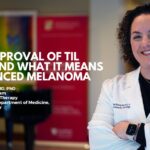Featured Survivor Story:
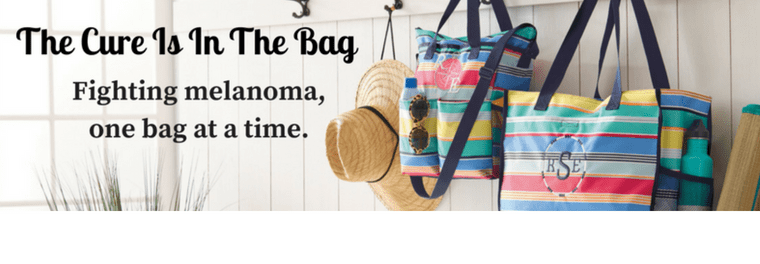

Meet Tracy Welge, a 41-year-old wife, mother, and melanoma survivor from Naperville, Illinois.
Two melanoma diagnoses, an entrepreneurial spirit, and a desire to do more converged in Tracy in 2012 and led her to start a business called The Cure is in the Bag. Since founding her business, she has donated all proceeds to melanoma research, and this month she will begin donating her proceeds to AIM at Melanoma. Thank you, Tracy!
What is your diagnosis?
I was first diagnosed in 2005 at age 28 with Stage I melanoma. I had a black mole on my right arm removed because it was itchy and bothering me. It was a very thin melanoma, and the dermatologist told me I was lucky to have caught it so early. In 2009, I had a lump in my right armpit of the same arm, and it hurt whenever I extended my arm. My daughter was four months old at the time and I thought maybe I had a clogged milk duct from nursing her. My doctor explained that I didn’t have milk ducts in my armpit (LOL) and referred me to a surgeon. It turned out that I had locally metastasized melanoma, Stage III with lymph node involvement. After completing surgery, I did a year of interferon at our local hospital. In 2014, my dermatologist found another melanoma, this time Stage 0, on my upper leg, which was removed with surgery and without further treatment.
How did you feel when you were first diagnosed?
With my first diagnosis, I was scared and did a lot of research on the internet, which made me feel even more worried. My dermatologist seemed optimistic, stating I had a 5% chance of recurrence. That made me feel better, but I later learned statistics don’t always define us. With my recurrence to my lymph nodes, I was terrified that I wouldn’t see my daughter grow up and felt like I should pull away from my family so it would be less difficult for them if I died from melanoma. I developed severe anxiety and depression .
What did you know about melanoma when you received your first diagnosis?
I was aware that melanoma was a serious skin cancer, but I thought it was something that affected elderly people. I also didn’t realize it could keep popping up once it was removed.
How did you tell your family about your diagnosis?
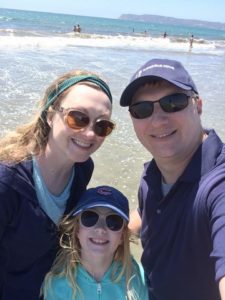 My husband was with me when the doctor told me it had become Stage III, and he was very supportive. It wasn’t until several months after I had finished the interferon treatments he told me how scared he had been. I told my parents over the phone and they tried to be optimistic (probably for as much for their sake as mine). My daughter was an infant so she didn’t know any different.
My husband was with me when the doctor told me it had become Stage III, and he was very supportive. It wasn’t until several months after I had finished the interferon treatments he told me how scared he had been. I told my parents over the phone and they tried to be optimistic (probably for as much for their sake as mine). My daughter was an infant so she didn’t know any different.
Do you have a good support system?
My friends, family, and coworkers were a huge support to us while I was going through interferon. My parents drove me to and sat with me at every infusion appointment. My boss was very understanding and supportive when I missed work for appointments, and my coworkers set up a meal plan for us. Some friends stepped up to be by my side and others drifted away, which was both disappointing and surprising to me. I joined an online patient forum, which probably did more harm than good for my anxiety because it seemed like warriors in the forum were losing their battles left and right.
I met a survivor named Kerri through the forum and she had gone through the exact same diagnosis as me a few years earlier. She graciously offered to let me call her and we talked for over an hour. I was struggling with the decision on whether to do interferon with an infant at home. She shared her story with me about how it was a really difficult decision for her because she also had young children at home. Her encouragement gave me the strength to make the decision that I knew was best for me.
My husband and I went to a volunteer training in Chicago to learn about fundraising for melanoma research where we met other melanoma patients and their families. We became very close to one Stage III melanoma survivor and another advocate who had lost his best friend to melanoma, and we all started working together to raise awareness and funds for melanoma. We’re still very good friends to this day.
What do you find was your biggest challenge during cancer treatment and into survivorship?
My biggest challenge was mentally dealing with the unknown. It’s true that something bad can happen at any moment to any of us, but when you’ve already personally experienced something that could kill you, it’s hard to not think about how it could come back again. Even now, almost ten years after my the melanoma spread to my lymph nodes, the unknown still scares me and I’m reminded that I’m not invincible every time I learn of a melanoma warrior losing their battle. But I cannot live my life in fear, and so I try to make a difference and I try to appreciate this life I’m given.
Where are you now in your melanoma journey?
I’m NED and focused on raising money to find a cure for melanoma.
What is The Cure is in the Bag?
The Cure is in The Bag is my Thirty-One business that I use as a vehicle to educate people about sun safety, create melanoma awareness, and raise money for foundations who support melanoma research. It’s something I started in 2012 as a way to give back and to give myself a feeling of fighting against something I really have no control over. I work through Facebook parties and also go to people’s homes to sell Thirty-One so that I can share with everyone my melanoma story and explain to them that there is no cure. It’s amazing how many new people I meet who have been affected by melanoma in some way and they connect with my story. Thirty-One pays me a 25% commission of sales and my customers know I donate all of my proceeds to melanoma research. As of today, I’ve donated over $21,000 to melanoma research just by selling some cute bags and sharing my melanoma journey.
I also have a Facebook page and group named The Cure is in The Bag where I share melanoma stories and talk about sunscreen, getting skin checks and staying safe in the sun in addition to information about my Thirty-One products. It’s nice because people will share in the group what sunscreens have worked for them and ask me questions. Sometimes melanoma warriors will share their personal stories in the group to help raise awareness. Friends will comment on how the group has encouraged them to get their skin checked and be more vigilant when it comes to sun protection. It’s a nice little community.
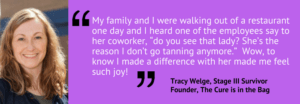
How has sharing your story has impacted your melanoma journey?
Sharing my story has made me feel like I can turn a very bad experience into a story of encouragement. I’ve met many warriors who are currently fighting or have been NED for several years. I’ve met families who have lost loved ones to melanoma or their loved one has just been diagnosed. These people have become my close friends and they’ve joined me in fundraising for melanoma research. It’s like having a bigger family.
I also have a full-time job as an HR Manager at a park district. We hire over 200 summer employees (mostly high school and college kids) who will be working outside under the sun for three months. Every year we have a big orientation for all the summer employees and I tell them my story in detail to educate them about how important it is they practice good sun protection and they don’t tan. Even if only one kid takes me seriously, it’s worth it. My family and I were walking out of a restaurant one day and I heard one of the employees say to her coworker, “do you see that lady? She’s the reason I don’t go tanning anymore.” Wow, to know I made a difference with her made me feel such joy!
How important is it to you to promote beautiful, naturally healthy skin?
It is so important! People need to know just how dangerous tanning can be to their health, that it can cost them their lives. It’s up to me to be a good role model for my young daughter and her friends to show them how beautiful our natural skin is and that we need to protect it. We need to show that we are confident in the skin we were born with. (Watch a clip of Tracy rockin her natural skin here!)
Have you been involved in other melanoma fundraisers, besides The Cure is in the Bag?
Yes! For the past eight years, I have organized a fundraiser called MelaNoNo benefiting melanoma research. It’s a nice grass-roots event where we celebrate life and honor those who have lost their melanoma fight. We have food, drinks, raffle prizes, and entertainment.
What do you do in your spare time?
I work full time in human resources, spend time with my husband, daughter, and two dogs, and enjoy yoga.
What advice would you share with someone facing melanoma?

I would tell that person You are not a statistic. Your melanoma journey is not written in stone, and there are new breakthroughs happening in melanoma research. I would also tell that person You need to be an advocate for yourself and speak up to your doctor.
You can follow Tracy on Facebook and join her Facebook group, “The Cure Is In The Bag VIP.”
Related Content
Recent Posts
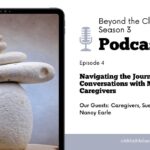
Navigating the Journey Together – Conversations with Melanoma Caregivers
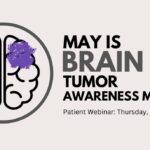
May is Brain Tumor Awareness Month

President’s Letter | April 2024

Celebrating a Milestone: 20 Years of the Dallas Steps Against Melanoma Walk
